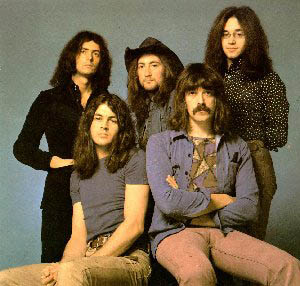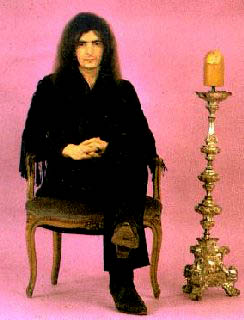|
Ritchie Blackmore Melody Maker Interviews '70 - '72 Vintage Interviews from the Deep Purple days [PART I]  If there's an odd man out in Deep Purple then that is Ritchie Blackmore, the fiery guitarist with a temper that lets fly on stage and snarls at an audience as a starving alsatian guarding a building site.
If there's an odd man out in Deep Purple then that is Ritchie Blackmore, the fiery guitarist with a temper that lets fly on stage and snarls at an audience as a starving alsatian guarding a building site.Moody, violent, arrogant and distinctly unsatisfied with his job in the group. That's Ritchie, who defies his critics with bland statements like "I've been playing a long time and I can play the ass off most guitarists around today. I know I can." He's probably right, too. Ritchie first picked up a guitar at the age of 11 and turned to his next door neighboor for advice. That was Jim Sullivan, brilliant session man and more recently Tom Jones' personal guitarist. Sullivan, who was playing with Marty Wilde at the time, taught Ritchie for two and a half years. In his early teens Ritchie was playing for groups with name like the Detonators and the Safonites. At 16 he was playing on sessions between gigs with the Outlaws, a notorious group who frequently attracted the attention of the law through chucking bags of flour out of their van at passers-by. "I was nearly put inside for a couple of months once. We had policemen waiting around when we did sessions because they knew we would cause trouble. We were a bit mad. We'd play at places and really smash them up. We got a lot of bills and not many return bookings." Ritchie was doing session work for Heinz and, because he needed the cash, he went on the road with him despite a dislike for the kind of music he was playing. "I went with him on pantomimes and summer seasons. It was terrible. Then I went with Lord Sutch for a time." The invitation to join Purple came when Ritchie was in Hamburg. The group was originally to be managed by Chris Curtiss, former drummer with the Searchers but that fell through. "But I knew there was something going on and Jon (Lord) was a great organist so I joined." Ritchie's violent style is often criticised as flash and over extrovert. "I am your original angry young man. I know I am. Basically I can't get across what I want to get across and I get very frustrated. I like leaping about and, sure, I like to show off too. Why not? I think people want to see something. They want to sense an atmosphere. They want to go home and remember something visual. "You!ve got to be careful otherwise you can look a right idiot. It's taking a big chance jumping around because if it goes wrong you look daft. It's much harder to play a guitar when 'you are throwing it around. I think it adds to the music but I play slightly worse when I am doing it. "I am pretty conceited about my playing. I know I am much better than most people but I can't get it across. People who say the leaping about is to cover up musical inadequacies are talking rubbish. I know I play the ass off most guitarists. I just like jumping around." How about smashing guitars? "I smash a guitar because I want to smash it. It excites an audience and they will go away talking about it. I try not to do it too much because it's been done before by Townsbend and Hendrix. © Melody Maker 1970 Ritchie Blackmore Melody Maker Interviews '70 - '72 Vintage Interviews from the Deep Purple days [PART II]  0ne plane which left Heathrow Airport bound for America off Tuesday-carried five young musicians who could be forgiven for keeping their fingers crossed as they lifted off the runway. "The musicians were Deep Purple - surely the unluckiest band in Britain this year.
0ne plane which left Heathrow Airport bound for America off Tuesday-carried five young musicians who could be forgiven for keeping their fingers crossed as they lifted off the runway. "The musicians were Deep Purple - surely the unluckiest band in Britain this year.Tuesday's flight to America represented their third attempt at completing an American tour. Before Christmas they had to break a tour midway when singer Ian Gillan caught hepatitis, and in April the same thing occurred again. That time it was guitarist Ritchie Blackmore who fell to the same complaint. The feeling in the band was numbed disbelief. The two cancelled tours came at a time when their American following was finally building to grand proportions. Truth is, though, that Blackmore, who hates America, was the least upset at this turn of events. Ritchie is the cat among the pigeons in the Purple camp - currently anxious to form a new group while, at the same time, remaining as guitarist with Deep Purple. With illnesses and touring holding things up, it's been eight months since Purple actually rehearsed together, admitted Ritchie. "We haven't had time. If we are going to play anything new we usually make it up in the hotel before going on stage. We are doing three tracks off the new album, but we've been so busy we haven't had any time to rehearse the rest." Purple's American following is increasing with each trip. On their last ill-fated tour the group pulled in mere fans at Minneapolis than Zeppelin and the Faces on their previous visits. "They are getting to know us well and the LP's are selling too. We seem to be the underground group for some reason, but we're getting the market together. This time we're only going there for two weeks to play the places we missed again, but we have two more American tours this summer." "We won't be appearing In Europe or England again before November or December which is a shame because I prefer playing here. I dig playing in Germany but things are falling off for us there because the German kids think we are capitalist pigs because we charge for our concerts. There is a big free music thing going on there. We've had this idea to play a concert there and give the kids back their money as they leave the theatre." With "Machine Head" at number two in the British album chart, it seems pointless to add that Ritchie is pleased with the album. But he was the sternest critic of "Fireball," the group's previous set, and even now you can't help feeling he'll never be 100 per cent satisfied with anything the group does. "I thinks 'Machine Head' is a good LP. Two tracks especially - 'Highway Star' and 'Smoke On The Water' - I like. The whole album is a lot better than the last one. 'Fireball' was nothing really, but it depends on what you like." As with all Purple's records, the tracks are Credited to all the group - but how much does each member contribute to the writing? "On this LP I wrote six tracks and Roger wrote two. I don't write the lyrics Ian Gillan does that, but you can say that the writing is done by Roger, Ian and myself. "I think the ideas are better and the group were playing well when we recorded it. The songs are more interesting too. We wrote when Ian was sick last time and we had a month off - it's the only time we get time off in this band when someone is ill. 'Fireball' was written on tour which is a hopeless way of doing it." Ritchie is taking his time over his solo project which may reach fruition by Christmas. Already he has written material which is not for Purple, and made tapes with Ian Paice at the drums and a bassist/vocalist from another group who wishes to remain nameless. "It's coming on very slowly, but I want to be sure about it. It's a sort of rock/blues band, very different from Purple. I would like to make a single with them because that's the quickest way to get things going, but they wouldn't play our kind of stuff on the radio. "We have got a couple of tracks down and I am pretty pleased with them. I want to do something where it is all my own fault if it goes wrong, or my own fault if it turns out good. "After Christmas it may be the turning point for Purple. We are having a good time but it's got to end sometime. Jon is doing his own things and Roger is into production. I just think there is room for more excitement in today's music and I want to do something about it. I think I can do something more exciting than Deep Purple." "Although we are all good musicians in Purple, we are limited to certain things. It's hard to write hard riffs all the time. I don't think we can get much bigger than we are at the moment and it's a nice position to be in. But it can't last for eyer." © Melody Maker May 27, 1972 |